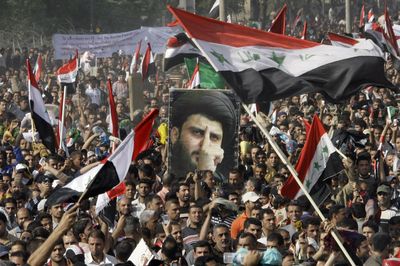Thousands of Iraqis rally against deal with U.S.
Parliament vote on agreement set for Monday

BAGHDAD – At the same spot where U.S. forces helped Iraqis topple a statue of Saddam Hussein in 2003, protesters Friday tore down an effigy of President Bush and set it afire during a protest over plans to keep American troops in Iraq through 2011.
Demonstrators began arriving at central Baghdad’s Firdous Square just after sunrise, some having walked hours across the capital. Most came from Sadr City, the stronghold of the Shiite Muslim cleric who called for the gathering, Muqtada al-Sadr.
The effigy of Bush, wearing a suit and tie and carrying a briefcase, dangled for hours as the crowd, which stretched for several city blocks, knelt in prayer and listened to clerics denounce the Status of Forces Agreement.
The pact, which is expected to be voted on in Iraqi’s parliament next week, sets a Dec. 31, 2011, deadline for the withdrawal of U.S. forces from Iraq and requires American combat troops to pull out of Iraqi cities, towns and villages by the end of next June. But some people interviewed in the crowd insisted the pact did not contain any withdrawal deadlines. Others said that whatever the pact said, they did not trust the U.S. or Iraqi governments to live up to it.
“They want to keep extending and extending,” Bassim Hamoud, dressed in a lavender shirt and pressed beige trousers, said as he prepared to pass one of the Iraqi army checkpoints set up on the edge of the rally. “If there was a concrete time limit, we would go for it.”
Asked what he wanted that time limit to be for a U.S. withdrawal, Hamoud replied, “We want them to leave today.”
Protesters’ comments reflected both the lack of knowledge of the pact and the distrust many Iraqis feel toward their government and the Americans as a result of unmet promises since the U.S.-led invasion. At the time of the Saddam statue’s toppling, most Iraqis were not expecting that nearly six years down the line, they still would be living in a city with spotty electricity, sewage running through the streets of their neighborhoods, military checkpoints choking traffic and bombs going off regularly.
The pact has been explained to the public at least twice by Prime Minister Nouri al-Maliki, whose support propelled it through the Cabinet on Sunday and onto the floor of the parliament. Legislators loyal to al-Sadr tried to prevent the reading of the pact in the legislature, leading to a brawl in the chamber Tuesday and stalling debate.
If a vote is not held early next week, before a scheduled lawmakers’ holiday, parliament could have trouble meeting a Dec. 31, 2008, deadline. That is when the U.N. mandate governing the presence of U.S. troops here expires. The new pact must be passed by then, or American forces will have no legal basis for being in Iraq.